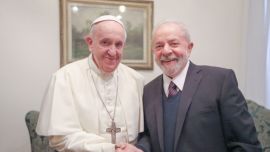The United States has trotted out onto the pitch late in the game, two goals down. During Uncle Sam’s absence, the competition plucked up its courage and shone on the field, storming into an early lead.
In Latin America, China and Russia have deployed an intense form of Covid-19 vaccine diplomacy dubbed “mercantilism” by the White House, while the US adopted an “America First” public health approach, preferring to immunise its own population as rapidly as possible.
But finally, the images of dozens of cargoes of vaccines sent by Xi Jinping and Vladimir Putin started to sink in for Washington, which felt that its “backyard” was being disputed by powers beyond the region. In response to these diplomatic goals, the US will be launching a global campaign to export and share its stock of vaccines “as soon as possible.”
According to sources consulted by Perfil, Biden will announce his initiative in June, when the US authorities expect to have completed vaccination of the adult population.
Earlier this month, the Centers for Disease Control and Prevention (CDC) reported 129.5 million people in the US as having received at least one shot of vaccine against Covid-19, of whom 82.5 million had also been inoculated with the second dose (where necessary).
At that rate, the US vaccination campaign will have been completed before Independencia Day (July 4), which might perhaps also mark the start of the end of coronavirus.
Biden wants his country to play a central role in the global struggle against coronavirus. The
prestige and influence of the superpower are at stake in the face of the global rise of China and its penetration into the trade and public health of the Western Hemisphere.
While passing through Buenos Aires last week, Juan González, US National Security Council Director for Western Hemisphere Affairs, let slip some details of the plan his government is working on for the distribution of vaccines.
“Latin America has a pretty high priority, given the impact of cases and the number of variants which have expanded there but also because they’re our neighbours,” he assured. “The main theme of the trip of Juan González was vaccine diplomacy. There is much concern about the advances being achieved by Russia and China in different parts of the region,” they affirm from Washington.
The Sino-American commercial, technological and geopolitical competition will also be influenced by the capacity to supply public welfare goods globally. In the last few weeks, Biden has been rehearsing some modest political gestures to mark out differences with Donald Trump, which he has so far been unable to exploit in terms of image or diplomacy.
The US president has not repeated often enough that his administration has donated US$4 billion (more than any other country) to the Covax initiative of the World Health Organization (WHO), apart from sending vaccines to Mexico and Canada, its USMCA and thus its most important regional partners.
Earlier this month the Democratic president also lifted the export ban on glass filters, a measure ordered by Trump last year and countersigned by Biden when taking office. This decision will permit the first vaccines of the Oxford-AstraZeneca shot, whose main ingredient is produced by mAbxience in Argentina, to arrive here in the next few days.
In designing his vaccine diplomacy, Biden will be bearing in mind Harvard Professor Robert Putnam’s theory of double-edged diplomacy for international bargaining. On the one hand, the political need to bolster economic recovery before the US midterms next year when control of Capitol Hill will be at stake. That urgency is driving him to draft public policies meeting the demands of his electorate, the Republican opposition and sectorial lobbies. But on the other hand, the need to preserve and maximise his global and regional influence, in order to reinforce his capacity to satisfy those internal pressures.
The economic, technological and geopolitical rise of China, the only superpower with both the capacity and the wish to compete for world leadership, means that Biden cannot neglect the international stage in order to preserve national interests and where that curious intersection between domestic and foreign policy is most explicitly seen is south of the border.
In a letter dated April 5, Senator Lindsey Graham (Republican-South Carolina) urged Dr. Anthony Fauci to travel there, arguing that the arrival of immigrants would spread Covid-19 in the United States.
While this message sought to sweeten the ears of Trump voters, it also exposed a weak point – the lack of US cooperation with its neighbouring countries to prevent the surge of new strains diminishing the efficacy of the vaccines and generating fresh economic disruption at home. In the era of the pandemic, no state is totally safe until all of them have immunised most of their populations.
While the main concern of US foreign policy regarding Mexico and the Northern Triangle revolves around immigration, the focus with South America and the Southern Cone is the strategic competition with China, the main trade partner of most of the region’s partners, with Argentina no exception. The visits of Admiral Craig Faller, who heads the US Southern Command, and of González, Biden’s main advisor for the region, indicate that this country is in the radar of the superpowers, trapped in the logic of strategic competition.
While the temperature of the relationship between Biden and Jair Bolsonaro is colder than Pfizer vaccines, Argentina, without being a close political ally like Colombia, can sit down and talk to the White House. The government of Alberto Fernández highlights as an asset that “the president maintains dialogue with all the leaders of the region.” That theory breathes optimism into the negotiations with Biden.
When the White House launches its campaign of vaccine diplomacy, Argentina and other Latin American and Asian Pacific countries will queue up to receive their slice of the abundant stock.
“The growing production of the two most successful vaccines in the world will make it possible to export doses of Pfizer and Moderna to countries like Argentina which are suffering a new wave of this devastating pandemic,” said Benjamin Gedan, deputy director of the Latin American Program and director of the Argentina Project at the Wilson Center.
With June only five weeks away, Washington is designing an immense global logistical framework to launch its plan. Its objective will be to show China and Russia that they are not the only ones coming to the rescue of the region, which will pass from being the “periphery penetrated” by powers beyond the region to the “besieged fortress” defended by vaccines, democratic rhetoric and the omnipresent fleet of the Southern Command.
“America is back.”
























Comments